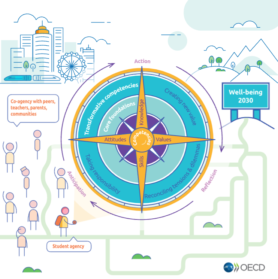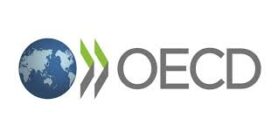Future of Education and Skills – OECD 2030

The OECD Learning Compass |
In dit OECD project E2030 wordt ondersteuning gegeven bij de centrale (onderwijs)discussie over kennis, vaardigheden en houding van de ‘lerende’.
The Future of Education and Skills 2030 (E2030) aims to help education systems determine the knowledge, skills, attitudes and values students need to thrive in and shape their future. |
Abstract E2030
Recognising the urgent need to open a global discussion about education, in 2015 the OECD launched the Future of Education and Skills 2030 project. The project aims to set goals and develop a common language for teaching and learning.
Phase I of the project focuses on curriculum redesign and developing a conceptual framework for learning 2030. Phase II focuses on curriculum implementation and creating a conceptual framework for teaching 2030.
MCDA sub-project – Mathematics Curriculum Document Analysis
The E2030 project’s overall goal is that of looking to the future in terms of how school curricula should evolve given the technological advances and other changes that societies are now facing. Towards that end, the E2030 project centres on the idea that education needs to equip students with the knowledge, skills, attitudes and values they need to become active, responsible and engaged citizens.
Mathematics is considered a highly relevant subject for achieving the above stated goals, as such it requires further and more detailed analysis. As a result, it has been chosen as one of the E2030 project’s subject-specific analyses.
The project has been named the Mathematics Curriculum Document Analysis (MCDA) study as per the request of participating countries. This working paper presents the findings of the MCDA study, which involves participants from 19 countries and jurisdictions.
The MCDA Research questions:
- how much and in what ways has the mathematics curriculum changed (the last 20 to 30 years …) in terms of its coverage of formal mathematics over the first 8 grades of schooling. Clearly, technology has impacted the mathematics curriculum with the advent of high-powered computers and calculators.
- to what extent and in what grades have ‘these topics’ (like formal statistics, measuring irregular geometrical shapes, algorithmic reasoning, etc.) been added to curricula in the early part of the 21st century?
- to what extent quantitative reasoning (including mathematics, statistical, algorithmic, and geometric reasoning), higher-order real-world applications, and 21st century competencies (knowledge, skills, attitudes and values) related to mathematics literacy have been added to the 19 countries’ and jurisdiction’s national standards and textbooks.
- to what extent do the 19 countries and jurisdictions provide teachers with textbooks that provide opportunities to learn both the formal topics of mathematics as well as those aspects related to mathematics literacy?
The OECD countries and jurisdictions participating in the study included: Australia, Estonia, Greece,
Hungary, Israel, Korea, Latvia, Lithuania, the Netherlands, New Zealand, Norway, Portugal, Sweden.
References
- Schmidt, W. H., Houang, R. T., Sullivan, W. F. and Cogan, L. S. (2022). When practice meets policy in mathematics education: A 19 country/jurisdiction case study (Vol. 268). Paris: OECD.
- OECD E2030 project



